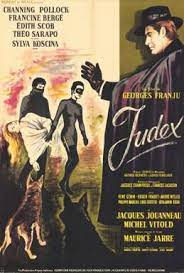
Favraux (Michel Vitold) is a wealthy but corrupt banker who has received a note from someone calling himself “Judex”. His secretary, Vallieres (Channing Pollock) tells him that Judex is a Latin term for Judge. The note appears to be a blackmail letter but instead of wanting money for himself, it states that Favraux must return the money he swindled from others. Favraux is not about to give away his fortune. Instead, he hires a private detective, Cocantin (Jacques Jouanneau) to find out who this Judex person is. A subsequent note warns Favraux that if he doesn’t return the funds by midnight he will be punished.
Favraux is planning a costume ball to celebrate the anniversary of his bank as well as the engagement of his widowed daughter, Jacqueline (Edith Scob), in an arranged marriage, to the Viscount Amaury de la Rochefontaine (Philippe Mareuil). Favraux himself is trying to woo Marie Verdier (Francine Berge), the governess of his granddaughter, Alice.
That night, during the ball, as Favraux is beginning his toast to his daughter, he falls over, apparently dead. In reality Favraux is drugged and is taken away to be kept prisoner by Judex (Channing Pollock) and his men. Judex had planned on killing Favraux but decides to spare him when he learns that Jacqueline, finding out about her father’s treachery, refuses her father’s wealth and gives it to the poor.
Governess Marie Verdier is in reality a murdering thief named Diana Monti and the head of a criminal gang. When Diana finds out that Favraux is really alive she plans on killing Jacqueline, rescuing Favraux, and marrying him so she can get back his fortune.
“Judex” was released in 1963 and was directed by Georges Franju. It is a French crime film and is a remake of the 1916 silent French serial. The film basically follows the plot of the serial except for a lot being cut out to pare down the 12 chapter 300-minute-long serial to a 94-minute film. Judex, which is Latin for Judge, was a French pulp hero comparable to “The Shadow” from American radio days.
Perhaps the movie isn’t the flamboyant and fascinating serial done previously by Louis Feuillade, but it does have a lot of wonderful visuals. It is a work of art in its own right. I was especially intrigued by the fantastic masks worn by guests at the costume ball. They were all either bird heads or bird inspired masks. The head mask warn by Channing Pollock was my favorite.
Channing Pollock was an American actor, who was also a magician, so his graceful movements went perfectly with his character. In his act he routinely produced doves out of thin air. This feature of his act is front and center in the film. He was proficient in sleight of hand and card tricks. At 6’4” his strikingly handsome features added to his appeal. Magician David Copperfield referred to him as “the James Bond of magic”.
True, the film is not as entertaining as the 1916 serial, but it is totally enjoyable for its own reasons.

